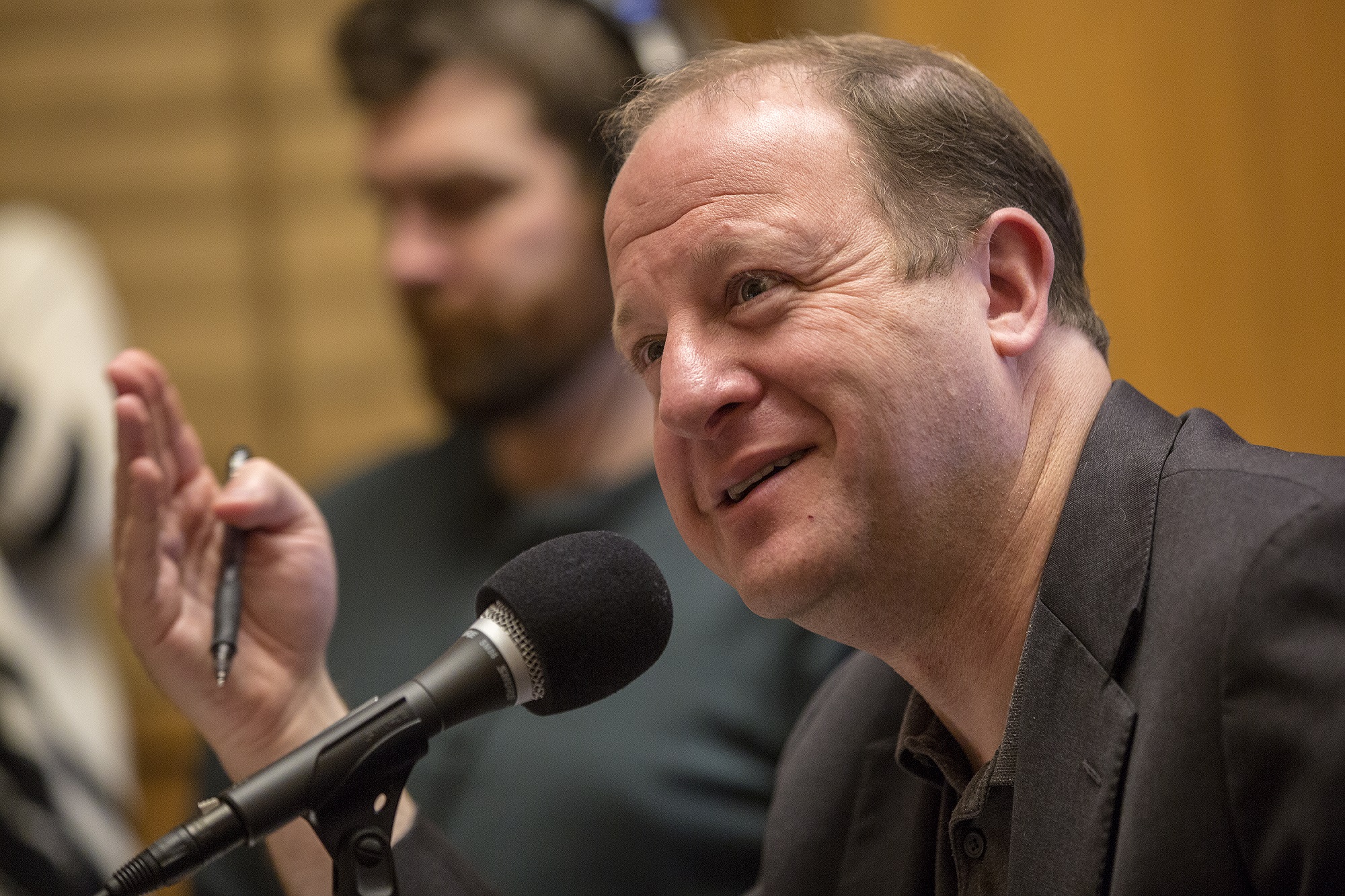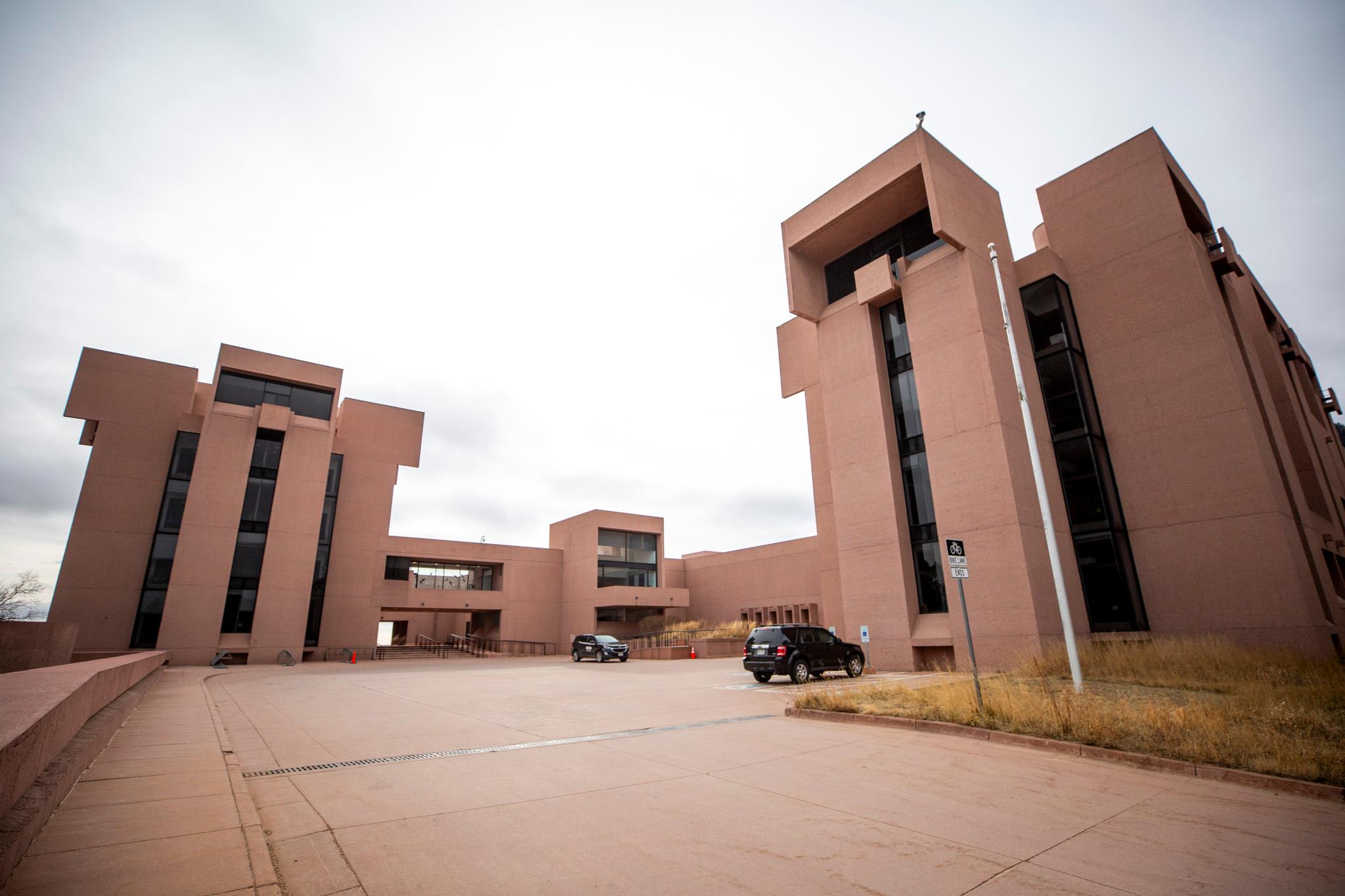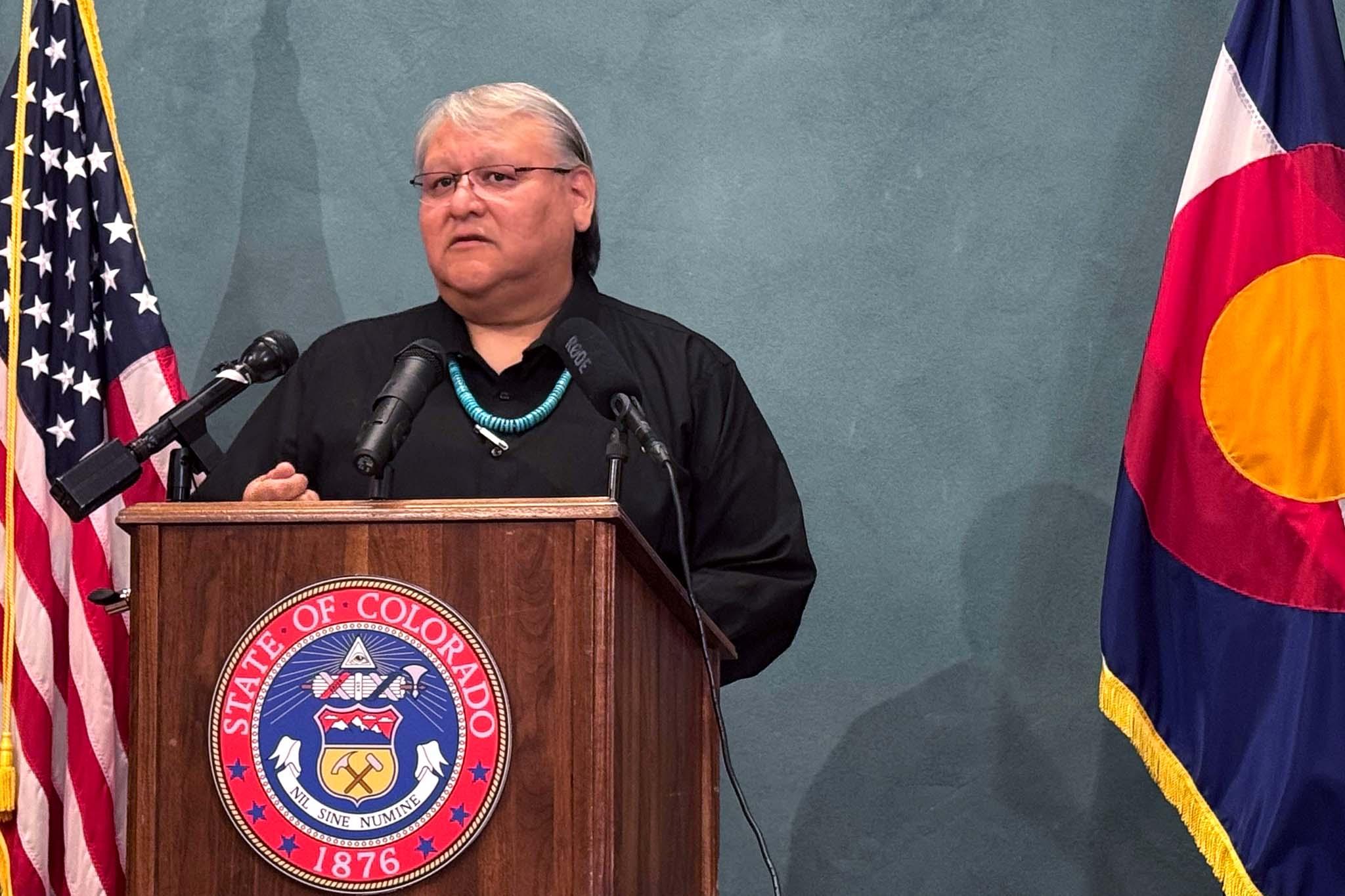
Democratic Gov. Jared Polis said Wednesday if lawmakers pass a proposal to end the state’s death penalty he’ll commute the sentence of convicted murderer Nathan Dunlap to life in prison.
“If the state, Republicans and Democrats, were to say, and I were to sign, a bill that said we no longer have the death penalty in Colorado … I would certainly take that as a strong indication that those who are currently on death row should have their sentences commuted to life in prison,” Polis said.
Dunlap was sentenced to death for murdering four people in Aurora in 1993. Polis’ predecessor, John Hickenlooper, favored the death penalty when he entered office but later changed his mind. As a result, he delayed Dunlap’s execution, but stopped short of commuting his sentence.
Because Democrats control both houses of the legislature, they could revoke the death penalty without Republican votes. However, Polis predicted the measure would win support from both sides of the aisle.
A death penalty bill is expected but hasn’t been introduced yet.
The same holds true for a proposal to tighten control over oil and gas development. The measure is expected to make health and safety the top consideration in state permitting decisions, and to increase local power over the location of drilling rigs. Polis said those are both priorities he wants to set.
The governor expressed some skepticism about an idea floated to deal with the state’s $7.5 billion backlog in transportation projects. The Denver Business Journal reports that House Speaker KC Becker of Boulder is talking to business leaders and other lawmakers about a measure that would ask voters to forego refunds they’re eligible for under the Taxpayer’s Bill of Rights. The money would then be spent for transportation and education.

The governor said he’s not foreclosing the idea, but he noted that the availability of refund money varies with the economy. He also needs to be convinced, Polis said, that voters would approve Becker’s proposal.
“Is this something the voters would want to do or is this something that would fail at the ballot box? We want to make sure it’s something that has broad popular support and wins,” he said.
The only transportation ideas Polis said he has ruled out are the two that voters rejected last November: One would have raised the state sales tax, while the other would have allowed Colorado to issue bonds for transportation improvements and repay the debt from existing state funds.
Polis, who took office on Jan. 8 after 10 years as a congressman, said he’s excited by the quicker pace of state government. The first bill he signed as governor, to change the way the state taxes beer, passed unanimously and quickly, Polis said.
“You know these things in Washington get bogged down...it takes three years sometimes. The legislature got that to my desk and done in about two weeks,” he said.
Polis has spent much of his first month in office promoting what he calls his top priority: setting aside $227 million in state money to pay for any school district that wants to offer full-day kindergarten.
The governor said he’s passionate about the idea because research shows full-day kindergarten boosts student achievement, because it saves parents the money they’d spend for kindergarten tuition or child care, and because it’s unfair that he can afford kindergarten for his children while others miss out on the experience.
“It’s a convergence of everything, from the data, which is where I start as somebody who’s fundamentally analytical, to the personal to the kind of cost-of-living side,” Polis said.
Full Transcript
Ryan Warner: This is Colorado Matters from CPR news. I'm Ryan Warner. Democrat Jared Polis has been Colorado's governor for a month now, and when I asked how he's liking the job, he told me he's thrilled he doesn't have to go to Washington every week. That was hard on his family when he was in Congress. But he's also thrilled not to deal with D.C. gridlock. We spoke in his office at the state Capitol. Gov. Jared Polis: I mean, I think that so much of the real action to improve people's lives, a lot of that action will really come about here in Colorado and there's just a stalemate in Washington and it really just seems likely that'll remain intractable for at least the short term. RW: Can you give me an example of an interaction maybe that you've had with a lawmaker or perhaps a lawmaker of a different party that gives you the sense, oh, Colorado is different from Washington. JP: Well, even the very first bill that the legislature was able to get to our desk, which they approved, I believe unanimously, which was a fix on the way that we tax beer in this state. Had we not fixed it, it would have gotten in the way of beer being available in supermarkets, which had been agreed to before. And these things in Washington get bogged down, they often have to be affixed to bills. It takes two, three years, sometimes. Legislature got that to my desk and done in about two weeks to the benefit of our craft brewing industry, to the benefit of consumers. And it got done very quickly. RW: And as smooth as all that might have been, Gov. Polis faced something thornier this week, whether to keep Denver teachers from striking, at least temporarily. On Wednesday he chose not to intervene, meaning the strike over pay and advancement starts Monday if the two sides don't reach an 11th hour agreement. Polis certainly hopes they will. JP: We are trying to push both sides to get back to meaningful negotiations. They're really not that far apart. They had a negotiating session a few days ago that didn't end well. We described that in our recent letter to both sides as a political farce. We want real negotiations to occur and I'm confident that hopefully both sides, we'll be able to iron out their differences, which at this point, are relatively minor. RW: Their differences, perhaps on paper, may be minor, but even you have acknowledged that a lot of the grievances go back decades. JP: Well, I think what you hit upon is correct. The teachers have a number of other issues with the way the district has been run. But in a contract negotiation, what's on the table is how teachers get paid, and the gaps are very narrow. And the thing with the strike is, it costs both sides money. The district has to continue to operate schools. Teachers don't get paid. They're not pleasant for anybody involved. Parents, well, might have a place to take their kids. I think DPS is going to keep their schools open. But, they're not going to have the same educational quality they would if the teachers are there. Obviously, the educators are a critical part. RW: I want to talk about an education issue that you've identified as your administration's top priority and that is money for full-day kindergarten. Of all the issues that you could have pushed, what is the motivation for you personally? Was there a pivotal moment or interaction as a parent? As a politician? JP: So it's all of the above, and I know you recently did an interview with Duke University Professor Harris Cooper, where you talked about the research behind full-day kindergarten. Certainly the research drives us, the early childhood education years, preschool and kindergarten are really the most important if we truly care about ending these achievement gaps, based on income and race. It's a cost of living issue for families. Certainly something that I heard on the campaign trail is, "How can I afford $400 a month, $300 a month of full-day kindergarten on top of my rent, on top of my car payment, my other expenses?" And why should families who can't afford it, why should their kids start out at an academic and social disadvantage to families that can? And certainly as a father of, this year, a preschooler, and our older son who was in kindergarten a couple of years ago. And knowing that, yes, you know, I can afford kindergarten for my child, and preschool, why should my kids start out in a different place over families that can't? So really it's a convergence of everything from the data, which is where I start as somebody who's fundamentally analytical, to the personal, to the kind of cost of living side. I know one family that has twin preschoolers and so, it's like, "Please, get this done." Now they cannot afford, obviously, kindergarten full day for both their kids. RW: Naturally, though, this will also pay for kids whose parents could afford it. JP: That's right. That frees up money, which means that they can save for college education. I've heard from families that, what this means is, "Oh my gosh, for that $300 or $400 a month that we're stretching for kindergarten, we can now start a college savings account for our kid." It might mean saving for retirement. It might mean summer enrichment programs for the kid, right? I mean, families have a limited budget, right? Whatever you earn, whether it's $60,000, $80,000, $100,000. I mean, most families are stretched. RW: That said, not too long ago, teachers from across the state marched on this building, the capitol, for higher pay. There's the possibility of a strike in Denver. Many Colorado districts now operate, I think as you know, on four day weeks, trying to save money. The state owes districts about $620 million this year alone because of, essentially an IOU that was written that dates back to the recession. Why not just send the money you've proposed for kindergarten to the districts and let them decide what their priorities are? JP: Well, the districts do receive the money. What we're simply saying is a value that kindergarten is every bit as important as first grade and second grade, and we want to treat it as such from the state from a funding perspective. There are some folks listening to this that might be saying, "Wait a minute, kindergarten was free for my kid." And that's true, in some schools in the state, and even in some districts, the district subsidizes kindergarten. What does that mean? It means they take that money out of grades 1 through 12, since they don't get the state funding for kindergarten, to close that gap. So in some cases, it saves the parent's money, in other cases, it means that the districts can return that money back to the grade 1 through 12 budget to pay teachers better for lower class sizes or even increase preschool learning opportunities which will go a long way towards meeting the wait list and the backlog of parents who can't get their kids into quality preschool. RW: Some lawmakers have questioned why you focus as strongly on kindergarten without proposing perhaps any additional money for transportation. I mean, as a candidate you said you didn't support a sales tax that was on the ballot for roads and bridges. Here's what you said about the issue though in your state of the state speech. JP: We have hundreds of millions of dollars to improve our roads over the next few years. But as we all know it's not enough to meet the challenge and we need to come together around a bipartisan funding mechanism to meet our current and future transportation needs that the voters of this state will accept and will continue to help our economy grow and Colorado to prosper. RW: Are you seeing any specific proposals in the legislature or are you trying to work with lawmakers on something for this session? JP: Well, first of all, we made the decision to hold transportation harmless to continue John Hickenlooper's commitment in the form of a $200 million general fund budget request in our budget. In terms of the long-term solution, you can't meet that out of operating funds in a given year. It requires some form of capital investment of bonding. The only two solutions that I would rule out are the ones that voters just rejected. We're not going to move forward with bonding without new revenue. The voters rejected that. We're not going to propose a 0.6 percent sales tax. The voters soundly rejected that. RW: Do you think a third way might emerge this session that you'd support? JP: I'm hopeful. That's the basis of discussions with Republicans and Democrats in the business community. RW: Here's an interesting idea from the speaker of the house, Casey Becker. According to the Denver Business Journal, she's floating a proposal to raise money by doing something called de-Brucing. The idea fundamentally is that voters would allow refunds that they'd get under the taxpayer bill of rights to remain in the states' hands and that that money could go to transportation and education. What do you think of that idea? JP: It's certainly something that she's approached us with, that we are open the discussion up. I think the key data point is, "Is this something that the voters of the state will want to do, or is this something that would fail at the ballot box?" We want to make sure it's something that has broad popular support and wins. And we want to make sure it's something that truly addresses the systemic underfunding that we have. The TABOR surplus is an example. I think we've only had one or two years out of the last 10. So that means for eight or nine of those years this particular proposal would not have generated any more revenue for the state. It would in some years. It wouldn't in others. But again, the only things we're ruling out are the things that failed. And absolutely, that's something that we've encouraged the Speaker to flesh out if they're going to move forward, that there's a coalition to actually get it done. RW: I think your very first executive order called for an increase in the use of electric vehicles, making them more affordable, providing the infrastructure to make sure they can plug in statewide. Why make that the priority when people are sitting in traffic jams? JP: Well, they're all a priority, right? But that doesn't mean that we should just stand still and not do anything, the $200 million that we're putting into transportation and reducing traffic. Obviously air quality is another thing we're deeply concerned about, and with our electric vehicle order we hope that the number of models of electric vehicles in Colorado will go from about 21 models which are available today, to 41 models. RW: Do consumers want them? JP: Well, absolutely. There's huge demand. Now models that weren't available in Colorado will be available in Colorado, including crossover SUV models that are not currently available here. RW: Maybe we can talk about fossil fuels at this point. Legislative Democrats are working on a package of reforms they say they'll introduce soon on oil and gas. That'll likely include a change in state policy, so that health and safety are top priorities when regulators consider permits. Also changes to give communities more power over where drilling takes place. I wonder if there's something specifically you'd like to see come of this this session. JP: Well Ryan you really hit on the two things I ran on and sort of our parameters for discussion is yes we want to formalize the local control piece and make sure that communities have a seat at the table around siting decisions that affect their quality of life. We want to make sure… RW: You don’t think there's a robust enough power at this point? JP: It's a very vague, gray area right now and that's why you often see lawsuits when cities and counties exert themselves. We really want to make sure there's an earlier stage in the process that cities and counties can play a role. I also strongly believe that we should put health and safety first. RW: Let's focus on criminal justice for a bit. A man who is sitting on death row, Nathan Dunlap, killed four people at an Aurora restaurant in 1993. Your predecessor, a fellow Democrat, John Hickenlooper, moved from favoring the death penalty to opposing it. And so he made sure Dunlap wasn't executed on his watch. But he did not go so far as to commute his sentence, saying he didn't want to foreclose on that possibility for a future governor. So the decision now rests on you. What will you do about Nathan Dunlap? JP: Well, what I have certainly said, during the campaign, is that if the legislature sends us a bill to eliminate the death penalty in Colorado, I would sign that bill. I think it's not cost effective, I think it's not an effective deterrent. And if the legislature were to abolish the death penalty, then I would strongly consider making sure that penalty that is no longer on the books in Colorado is not carried out for anybody who's in that process. RW: That is to say, it's not just for those who might get serious sentences going forward, but you would apply that to those who had gotten capital sentences prior. JP: Well, again, I don't know what exactly will be in the bill, but I would certainly view them together. If the State Republicans and Democrats were to say, and I were to sign a bill that said we no longer have the death penalty in Colorado, whether it's formally in the bill or not, I would certainly take that as a strong indication that those who are currently on death row should have their sentences commuted to life in prison. RW: Though you wouldn't even need Republicans necessarily, because Democrats control both chambers. JP: Well, it's always been a bipartisan issue. Obviously among the most outspoken opponents of the death penalty are the Catholic Church and many in the faith community. RW: Do you think a bill like that will land on your desk this session? Or [crosstalk] ... JP: Well you're asking me to prognosticate here? RW: Or to tell me about conversations you've had. JP: You know, I don't know Ryan. I'm not pundit. My job, it's clear to say where I stand. Please don't ask me to predict what the wonderful, thoughtful legislators on both sides on the aisle will get across the finish line. RW: I only ask, thinking you might have been a part of conversations. I certainly don't expect you to have a crystal ball. JP: And again, we're very clear about what we'll sign, and we try to, for bills that we don't like, we're also clear about those, and bills will be working their way through the process. RW: More than 99 percent of the state's prison beds are currently full. Projections call for thousands more prisoners to enter the system in coming years, but your budget doesn't call for construction of any new beds. Is that safe for the public? JP: So we proposed a bed-neutral proposal with corrections, and we are very interested in this discussion of criminal justice reform. Meaning, right now, we have things that are dumped on our criminal justice system, that are often substance abuse issues, mental health issues, that are more costly for tax-payers to deal with on the criminal justice side. And also, frankly, less effective in keeping people safe and preventing recidivism. So we are proposing that we maintain a neutral number of beds, as we look at alternative treatment for folks that don't necessarily benefit from incarceration, and the public isn't made any safer. RW: But that, too, sounds costly. Proper treatment, which often has to be long term and people fail and have to try again. JP: There's the good news though, it absolutely costs money, but it still costs less than the cost of incarceration, which is about the highest cost form of intervention that the state can do. You know, it's $110, $120, $130 a day per inmate, very expensive. RW: But can that be reflected in a year to year budget? JP: We can begin to reflect those values in our budget, which we are, but it's certainly much more than a one year discussion. RW: I want to talk a little bit about immigration, which played prominently in President Trump's State of the Union Address earlier this week. Immigrant advocates and Democrats and the legislature are working on proposals to shield undocumented immigrants from ICE, including banning county sheriffs from holding people in jails at ICEs request, prohibiting sheriffs from participating in a federal program that enables them to do federal work for ICE. Have you taken a position on these types of proposals? JP: Not on the two that you mentioned. I've certainly said that I'm not in favor of any efforts that would make Colorado a sanctuary state. I support local control of law enforcement and that hasn't changed and I don't expect it to change. RW: You don't want to see, in other words, some blanket policy that prevents, for instance, a county from being as helpful to ICE as they'd like? JP: Well, I believe in local control of law enforcement and that, you know, that cuts all ways. Obviously there's guardrails on that in terms of the civil rights of everybody in Colorado has and due process. Until the federal government fixes this immigration issue, of course we're going to do the very best we can here with Dreamers, with those who lack documentation through no fault of their own. There's no good thing and way that a state can solve it, other than, "Let's just do the best we can with what we have to make sure that crimes are reported, there's a relationship of trust between law enforcement and marginalized communities, that we address the public heath side, because when folks are not ensured and aren't healthy, that drives up the cost for the rest of us." And I think there's a number of bills and a number of steps, administratively, we can take in that direction. RW: It's interesting you mention the cost of health care. I had this thought while I was watching the State of the Union, there's one thing that it at least appears, Donald Trump and Jared Polis agree on, and that is lowering the cost of health care. I wonder if you watched the State of the Union, and if you thought, "Well, on this issue, maybe we can accomplish something together." JP: Well, I sure hope that the Trump administration puts their movement where their mouth is, because if several of the bills we're working on here can get to my desk, namely, drug importation and reinsurance, we actually will need waivers from the federal government to be able to move forward with many of our proposed reforms to save people money on heath care here in Colorado. RW: Gov. Polis, thanks for your time. JP: Thank you, Ryan. |








